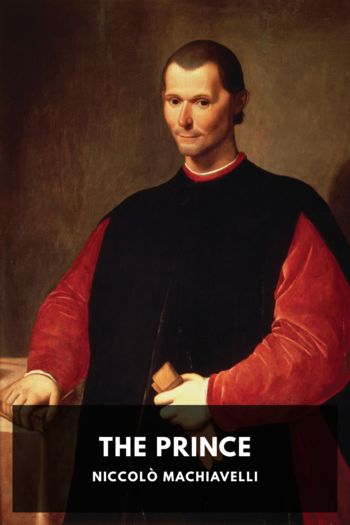The Prince - Niccolò Machiavelli (ebooks online reader txt) 📗

- Author: Niccolò Machiavelli
Book online «The Prince - Niccolò Machiavelli (ebooks online reader txt) 📗». Author Niccolò Machiavelli
States that rise unexpectedly, then, like all other things in nature which are born and grow rapidly, cannot leave their foundations and correspondencies8 fixed in such a way that the first storm will not overthrow them; unless, as is said, those who unexpectedly become princes are men of so much ability that they know they have to be prepared at once to hold that which fortune has thrown into their laps, and that those foundations, which others have laid before they became princes, they must lay afterwards.
Concerning these two methods of rising to be a prince by ability or fortune, I wish to adduce two examples within our own recollection, and these are Francesco Sforza9 and Cesare Borgia. Francesco, by proper means and with great ability, from being a private person rose to be Duke of Milan, and that which he had acquired with a thousand anxieties he kept with little trouble. On the other hand, Cesare Borgia, called by the people Duke Valentino, acquired his state during the ascendancy of his father, and on its decline he lost it, notwithstanding that he had taken every measure and done all that ought to be done by a wise and able man to fix firmly his roots in the states which the arms and fortunes of others had bestowed on him.
Because, as is stated above, he who has not first laid his foundations may be able with great ability to lay them afterwards, but they will be laid with trouble to the architect and danger to the building. If, therefore, all the steps taken by the duke be considered, it will be seen that he laid solid foundations for his future power, and I do not consider it superfluous to discuss them, because I do not know what better precepts to give a new prince than the example of his actions; and if his dispositions were of no avail, that was not his fault, but the extraordinary and extreme malignity of fortune.
Alexander the Sixth, in wishing to aggrandize the duke, his son, had many immediate and prospective difficulties. Firstly, he did not see his way to make him master of any state that was not a state of the Church; and if he was willing to rob the Church he knew that the Duke of Milan and the Venetians would not consent, because Faenza and Rimini were already under the protection of the Venetians. Besides this, he saw the arms of Italy, especially those by which he might have been assisted, in hands that would fear the aggrandizement of the Pope, namely, the Orsini and the Colonnesi and their following. It behoved him, therefore, to upset this state of affairs and embroil the powers, so as to make himself securely master of part of their states. This was easy for him to do, because he found the Venetians, moved by other reasons, inclined to bring back the French into Italy; he would not only not oppose this, but he would render it more easy by dissolving the former marriage of King Louis. Therefore the king came into Italy with the assistance of the Venetians and the consent of Alexander. He was no sooner in Milan than the Pope had soldiers from him for the attempt on the Romagna, which yielded to him on the reputation of the king. The duke, therefore, having acquired the Romagna and beaten the Colonnesi, while wishing to hold that and to advance further, was hindered by two things: the one, his forces did not appear loyal to him, the other, the goodwill of France: that is to say, he feared that the forces of the Orsini, which he was using, would not stand to him, that not only might they hinder him from winning more, but might themselves seize what he had won, and that the king might also do the same. Of the Orsini he had a warning when, after taking Faenza and attacking Bologna, he saw them go very unwillingly to that attack. And as to the king, he learned his mind when he himself, after taking the Duchy of Urbino, attacked Tuscany, and the king made him desist from that undertaking; hence the duke decided to depend no more upon the arms and the luck of others.
For the first thing he weakened the Orsini and Colonnesi parties in Rome, by gaining to himself all their adherents who were gentlemen, making them his gentlemen, giving them good pay, and, according to their rank, honouring them with office and command in such a way that in a few months all attachment to the factions was destroyed and turned entirely to the duke. After this he awaited an opportunity to crush the Orsini, having scattered the adherents of the Colonna house. This came to him soon and he used it well; for the Orsini, perceiving at length that the aggrandizement of the duke and the





Comments (0)